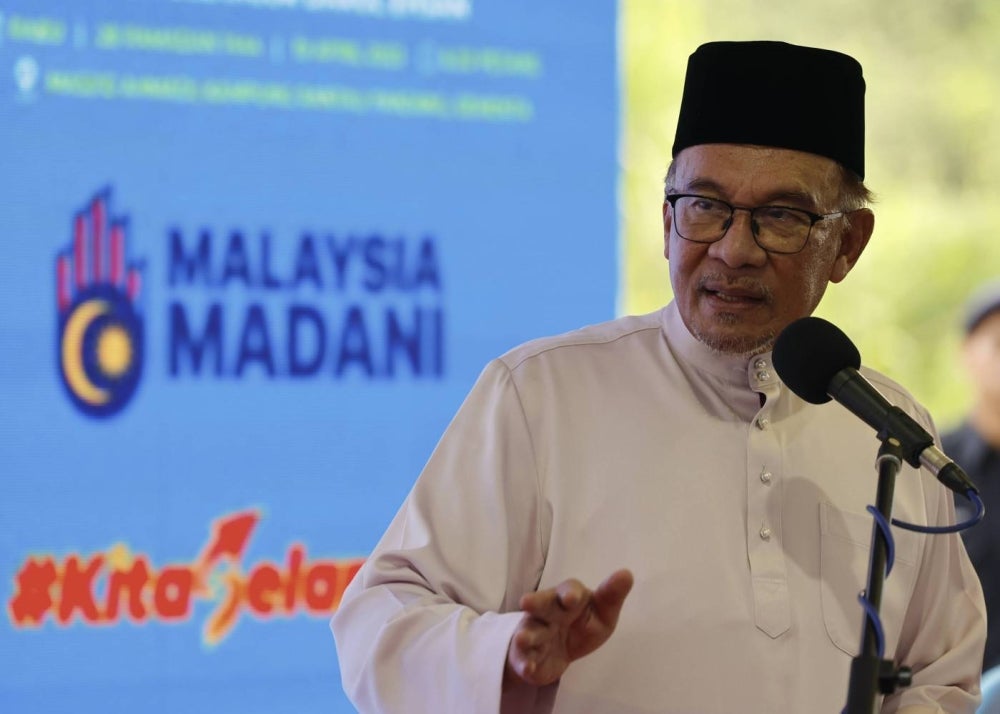Reflecting on Anwar's one-year-old Madani experiment

SHAH ALAM - Malaysia’s Madani Government turns one year old today.
Born from the politcal fatigue that had won no single party the right to rule after the country had its 15th General Election (GE15), this government has an unusual DNA.
It is made up of foes that have spent decades trying to best each other in the political arena.
“This partnership of Umno and Pakatan Harapan (PH). Many did not expect it and when there is such a partnership, political realignment will be difficult to do,” said political scientist Dr Abdul Aziz Azizam of Universiti Teknologi Mara.
“It’s like Murphy’s Law in reverse. You can’t really change anything but when you don’t change anything, it’ll end up harming yourself,” he added.
To assuage supporters who were stunned by the incredulous union; the political leaders from the two parties touted unity as the vital reason why the political hatchet needed to be buried.
And while skeptics were plenty, there were also many who were more than willing to give the Madani Government the benefit of the doubt.
The expectation of the public has been quite high for this current government, Abdul Aziz remarked.
“Because before this when they were in the opposition, they came up with a lot of formulas, a lot of bombastic ideas.
“So, the public really want to see them doing what they preached now that they are in power. This is their chance to prove to the people that they can do something big,” he reasoned.
However, political weariness seemed to have crept its way back.
The political clout and prowess of the Madani Government was eventually put to test in the Aug 12 state polls in Kedah, Kelantan, Terengganu, Penang, Selangor and Negeri Sembilan.
The electoral battle ended in a draw, with the equation being the same. PH retained its three states of Penang, Selangor and Negeri Sembilan whereas Perikatan Nasional (PN) kept Kedah, Kelantan and Terengganu.
Umno however, won not a single state in the electoral contest. Basically, it was purely status quo.
Abdul Aziz reasoned that had the Madani Government managed to capture at least one state, then the current political landscape would have been more favourable to them.
“The opposition has not only shown that they are good enough to maintain their grip on the three states but also proven to the current government that the latter cannot get additional support from the public,” he explained.
What made the Madani Government’s electoral loss more worrying was that it happened in the three Malay heartlands -- Kedah, Kelantan and Terengganu.
The trouncing not only lent gravitas but also underscored the diminishing influence of Prime Minister Datuk Seri Anwar Ibrahim’s among Malaysia’s ethnic majority -- the Malays.
This trend became particularly evident following the nationwide ban on public discourse on matters concerning race, religion and royal institutions that was enforced to supposedly safeguard social harmony.
The gag-order was a double-edged sword, argued Abdul Aziz, because it can imply that the country did not have social harmony prior to its enforcement.
“It also stops the dominant ethnic group [the Malays] from speaking about themselves. If they cannot talk about themselves, then who else is going to talk about the Malays. I don’t quite see the logic of this [ban],” said Abdul Aziz.
Even with the inclusion of Umno, the Madani Government has yet to be able to solidify its foothold on the Malays.
This, however, was a no-brainer, because in GE15, the Malays have rejected Umno.
Once deemed the sacred party of the Malays, Umno which won 54 parliamentary seats in GE14 saw its tally of electoral representation severely reduced to a mere 30 parliamentary seats in GE15.
Abdul Aziz believed that Umno, since then, has been on survival mode.
“They have a lot of internal issues that they need to clean up first before they can reclaim the title of being the supreme party for the Malays.
“Its president, Datuk Seri Ahmad Zahid Hamidi, who was previously charged [in court for corruption] has now been cleared; supposedly they can win more but that verdict has not been translated into anything at the moment,” said Abdul Aziz.
With that being said, he was also of the opinion that the Madani Government will unlikely fall any time soon, that it will even probably continue to remain in Putrajaya for a full term.
“They will remain in power but there is no guarantee if the public will be happier with them,” was how Abdul Aziz put it.
Apart from the political roller-coaster, Malaysians have also braved and endured a challenging economic climate.
The economy saw its slowest growth in almost two years in the second quarter of 2023 due to declining exports and a global economic slowdown.
This however, according to economist Dr Geoffrey Williams of Malaysia University of Science and Technology, was more of a "business cycle slowdown" rather than an imminent recession, which aligns with global economic trends.
“But overall the performance has been quite good. The headline inflation is now back to where it normally is, which is a little bit under two per cent. Underlying inflation is a little bit high but it’s much lower than it has been in the past.
“Unemployement is low. The economic growth is lower than we would hoped but it has kept up considering how difficult the international environment has been. The economic picture now is much normal,” said Williams.
In spite of that, many are still feeling the pinch.
Williams concurred, pointing out that there was no denying that people were still beleaguered by the economic conditions.
“At the shops, the prices are higher. Noticeably higher. One of the biggest concerns has always been the prices of foods.
“That’s why when people look at the headline inflation figure, they say that it does not reflect what has been going on with their life.
“Actually, it reflects what’s going on in the wider economy but it doesn’t reflect what’s going on when you’re going to the shop to buy food or going to the restaurant to eat, that’s actually where the issue is,” said Williams.
One of the many factors that caused the issue, added Williams, was bad policies.
A case in point, he cited was the chicken subsidy in which when the government finally decided to discontinue it, the retail price of chicken fell.
“Everybody said when you remove the subsidy, the chicken price will go up but it has actually fallen and the reason is the subsidy had the effect of holding up the price because the RM9.40 per kilogramme was seen as the target price by the suppliers.
“Even though they can supply it more cheaply, the didn’t because they knew they could get away with it. So when you remove that interference in the marketplace, the prices normalise, that is why we see the prices of chicken going down,” Williams explained.
With just one month left until the new year, the outlook for 2024 appeared to still be relatively challenging, though Williams predicted that it will still probably be kinder than 2023.
“Your salaries aren’t going to go up. Your income is not going to go up. Prices will continue to rise but they will do so at a slower rate. That’s the overall scenario. It won’t get much better but it won’t get much worse either.
“So, what I would expect from next year is more normal inflation, more normal growth, more normal employment environment and it’s a bit of a breather. You can sort of relax because it will be more stable. Hopefully,” said Williams.












